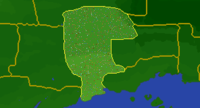Lore:Nightmare Host
The Nightmare Host was an undead horde led by a lich consisting of ghosts, skeletons, vampires, and zombies. They served the Camoran Usurper and fought in the Battle of Wightmoor, which was one of many conflicts during the greater conflict in which the Camoran Usurper invaded western Tamriel.[1][2]
History[edit]
Prior to his conquest over the Iliac Bay,[2] concurrent to the Battle of Dragontooth,[3]:8 the Camoran Usurper sent an undead horde called the Nightmare Host to control the Barony of Dwynnen for currently unknown reasons.[2] According to Bretonic legends, the horde was led by a lich controlling an army of ghosts, skeletons, vampires, and zombies, all the while held up in Castle Wightmoor. They were destroyed by Othrok, blessed by the gods, who emerged from the wilderness with an army of men and animals in order to secure Dwynnen.[4][1] They also fought the Order of the Raven.[5] This event was known as the Battle of Wightmoor and took place in the capital city of Dwynnen on the 5th of Sun's Dawn in 3E 253.[4][1]
The people of the Dwynnen Barony celebrate a holiday called Othroktide on the 5th of Sun's Dawn each year not just as a memorial to their liberation from the Nightmare Host,[4] but also to honor Baron Othrok himself,[6] who has since been remembered as a hero among the Bretons. Othrok's divine purpose is a central theme in Othroktide.[1]
Notes[edit]
- The Camoran Usurper, according to legends also utilized an army that by legend consisted entirely of the undead and Daedra to conquer Hammerfell and Valenwood. In fact, it was mostly composed of Redguards and Bosmer, however.[1][7] Whether it was connected to the Nightmare Host is unknown, however.
- In the book The Third Era Timeline, Haymon Camoran is described as a Lich. The book also hints at a possible connection to the Nightmare Host, though it is uncertain whether Camoran led the Host personally or some other Lich under his command led them in his stead.[2]
References[edit]
- ^ a b c d e The Fall of the Usurper — Palaux Illthre
- ^ a b c d The Third Era Timeline — Jaspus Ignateous
- ^ The Daggerfall Chronicles — Ronald Wartow
- ^ a b c Othroktide holiday description in Daggerfall
- ^ Order of the Raven's description in Daggerfall
- ^ Holidays of the Iliac Bay — Theth-i
- ^ Brief History of the Empire — Stronach k'Thojj III
